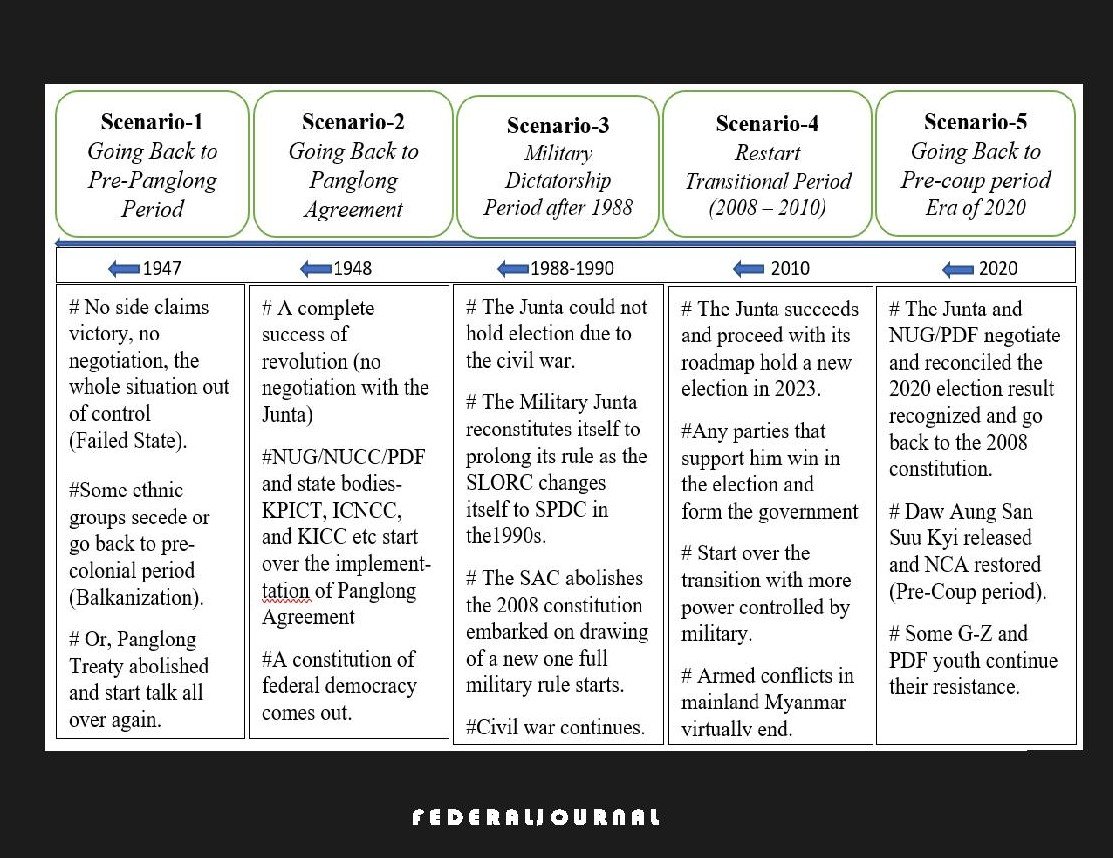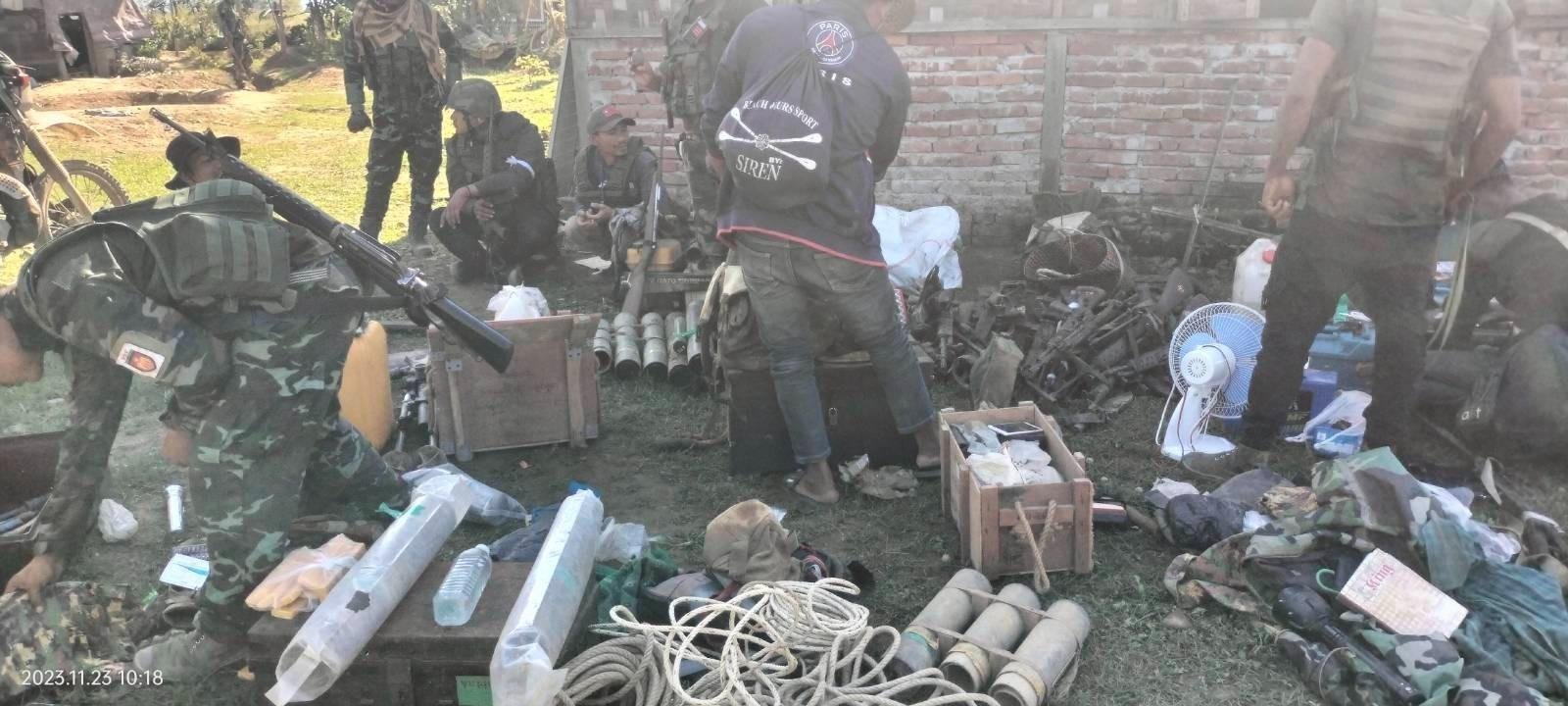
“To What Political Period will the Backtracking Myanmar Go Back”
Salai Ceu Bik Thawng (Article)
Federal Journal, October – 7, 2021
Scholars and political leaders, over the past decade, have discussed the question of whether Myanmar’s transition could backtrack or not and most predicted that the transition could not reverse. But today all these predictions prove wrong. The situation has gone into total reverse.
The question now we have is to what past period the political backtracking will go? As some ethnic minorities say, would it go back to the Pre-Panglong period or will it lead to the restoration of the Panglong Agreement? If not, will it return to the 1988 – 90 period which saw the prolonging of military dictatorship or to the 2008 – 2010 period? Or will it just lead to the pre-coup period by recognizing the 2020 general election result?
As for me, I imagine any of the following five possible scenarios will unfold after this conflict. (They are also set out in the table below.)
Scenario–1: Going Back to Pre-Panglong Period
If the ongoing civil war intensifies and gets out of control, the country will become a failed state like Syria. If this happens, there is a likelihood that this will lead to the kind of Pre-Panglong Period in which each ethnic group/ state will claim their own respective political sovereignty. (If this happens, this should not be taken lightly as wanting to secede; this can be sub-national sovereignty like those of Switzerland’s cantons.)
If this situation does take place, there are two possible scenarios: one is that the Panglong Agreement is abolished, and issues like joining the union or not are discussed all over again as a meaningful means of coming together federal system; the other scenario is the situation leads to Balkanization in which there are no discussions nor negotiations and each group sets out on their own political journey.
When this scenario arrives, the majority of ethnic groups/states may want to stay in the union in the form of federation whereas others might want a greater degree of autonomy in the form of confederation or set up their own independent nations with their own respective interpretation of self-determination.
In response to these developments, activities of Bama-centric chauvinists like Ma-Ba-Tha are likely to be seen in this scenario.
Scenario–2: Going Back to Panglong Agreement
If the revolution succeeds fully and there is no need for negotiation with the military, the NUG/PDF, ethnic armed organizations and other subnational coordination groupings such as KPICT, ICNCC and KNCC will jointly lead the implementation of the Panglong Agreement bringing in a scenario of federal democracy building. There is still, however, an air of uncertainty as to whether the leaders of Bamar would keep their promise when they no longer need the help of ethnic minorities. There had been an instance of Bamar leaders failing to implement their promise in the 1947-48 years.
In this scenario, the majority of an ethnic group are likely to stick to their original positions of building a federal union while some groups would seek secession or confederation as mentioned in Scenario-1.
Scenario– 3: Military Dictatorship Period after 88 Revolution
If the anti-junta movement fails and the Junta cannot materialize its plan of holding a general election either, it can resort to old methods used in the post-1990s period to extend its hold on power. In spite of his claim of caretaking of power for a short period of time and his frequent assertions of handing back it over within two and a half years as required by the constitution, military chief, Min Aung Hlaing, may be unable to hold an election to hand over power, and therefore he is likely to follow his Plan-B. As the State Law and Order Restoration Council (SLORC) which was formed in 1988 was reconstituted as State Peace and Development Council (SPDC) in 1997, the current State Administration Council and Caretaker Government would also be replaced with a different name in order to prolong the military rule.
Besides, it is very likely that the military abolishes the 2008 constitution on the grounds that it fails to conduct election within two and a half years and set out on the drafting of a new constitution as had happened in 1993 which set off the 2008 Constitution drafting process by convening National Convention. This will extend the military chief’s rule. The abolishment of the constitution can be partly the result of failing several times to follow the charter that the military themselves drew up.
In this scenario, the military is unlikely to put a complete end to the civil war and enters into three or four years of armed conflicts and being unable to take control of territories in some ethnic minority areas as well as in some areas of mainland Myanmar.
Scenario– 4: Restart of Transitional Period (2008 – 2010)
This scenario of restarting the transitional period from the beginning of 2008-2010 is assumed where military junta exactly wants to go back. Min Aung Hlaing and his group are not happy with the reforms carried out by Daw Aung San Suu Kyi after taking over power from U Thein Sein, and this is supposedly the reason why the military wants to go back to the starting point.
If the SAC is able to put the situation under control, it will hold, in accordance with the 2008 constitution, a minimal election just like the one in 2010, and rig the election for any parties and candidates that support the military.
Min Aung Hlaing, unlike his predecessor, Than Shwe, is still power-hungry and assuming that he is still too young to retire, will probably put himself as president if he can create this scenario, and is highly likely to extend his presidency for two executive terms until 2033. Or he can install U Thein Sein as a nominal president who assisted him much in the coup. A scholar who has connections with the USDP party said that the military chief agreed to install U Thein Sein as president of the party had won in the 2020 election.
Scenario– 5: Going Back to Pre-Coup Period
Assuming that it is a draw game, and both sides – the Military Junta and the NUG – put an end to the head-on confrontation and reach an agreement, this will bring in the pre-coup period scenario. If this happens, Daw Aung San Suu Kyi and other political detainees will be released and then the NLD will form a government as mandated by the 2020 election result. There can also be internal coups within the military and some military top brasses can flee abroad.
This scenario of the NLD reconciling with the bloody-handed military leaders and going back to the 2008 constitution will be opposed bitterly by youths who are involved in this revolution. For this reason, Daw Aung San Suu Kyi and the international community’s intervention will not be able to calm down the situation, as least, within a short period of time.
Overall Assessment
Out of the five scenarios described above, the majority of ethnic minority groups might want to see Scenario-2 that goes back to Panglong Agreement. However, since returning to this period needs the nearly overall, if not full, success of the revolution, the prospect of this scenario to come out is comparatively low considering the ongoing situation.
In order not to prolong the military dictatorship as in Scenario 3– and 4, it is very important that more effort is put into the revolution so that it succeeds. More effort is required for the following reasons: things have not turned out as expected even after one month period of the D-Day declaration by the NUG/PDF; some ethnic-based armed organizations and political parties focusing only on their own interests; the revolution not receiving international support as expected, and possessing unhelpful neighbouring countries. All these factors are still threatening the prospect of the revolution succeeding.
Some five months ago, youths including me shouted “if it is a draw game, it is a loss for us” as we protested on the streets of Yangon. By this, we meant decisive victory and no negotiation at all with the junta. For all these, since politics is a game, it is important that the game at least needs to be a draw even if the revolution does not conclude in a decisive victory for the people. We must not lose the fight.




